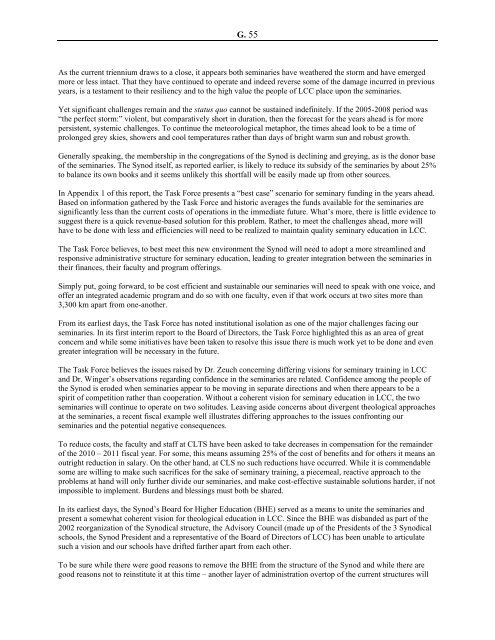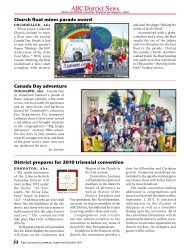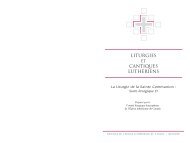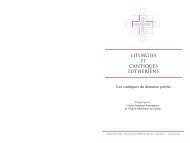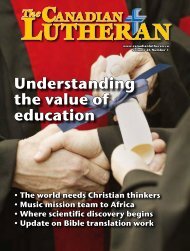Planned Giving Gift Summary - Lutheran Church-Canada
Planned Giving Gift Summary - Lutheran Church-Canada
Planned Giving Gift Summary - Lutheran Church-Canada
You also want an ePaper? Increase the reach of your titles
YUMPU automatically turns print PDFs into web optimized ePapers that Google loves.
G. 55<br />
As the current triennium draws to a close, it appears both seminaries have weathered the storm and have emerged<br />
more or less intact. That they have continued to operate and indeed reverse some of the damage incurred in previous<br />
years, is a testament to their resiliency and to the high value the people of LCC place upon the seminaries.<br />
Yet significant challenges remain and the status quo cannot be sustained indefinitely. If the 2005-2008 period was<br />
“the perfect storm:” violent, but comparatively short in duration, then the forecast for the years ahead is for more<br />
persistent, systemic challenges. To continue the meteorological metaphor, the times ahead look to be a time of<br />
prolonged grey skies, showers and cool temperatures rather than days of bright warm sun and robust growth.<br />
Generally speaking, the membership in the congregations of the Synod is declining and greying, as is the donor base<br />
of the seminaries. The Synod itself, as reported earlier, is likely to reduce its subsidy of the seminaries by about 25%<br />
to balance its own books and it seems unlikely this shortfall will be easily made up from other sources.<br />
In Appendix 1 of this report, the Task Force presents a “best case” scenario for seminary funding in the years ahead.<br />
Based on information gathered by the Task Force and historic averages the funds available for the seminaries are<br />
significantly less than the current costs of operations in the immediate future. What’s more, there is little evidence to<br />
suggest there is a quick revenue-based solution for this problem. Rather, to meet the challenges ahead, more will<br />
have to be done with less and efficiencies will need to be realized to maintain quality seminary education in LCC.<br />
The Task Force believes, to best meet this new environment the Synod will need to adopt a more streamlined and<br />
responsive administrative structure for seminary education, leading to greater integration between the seminaries in<br />
their finances, their faculty and program offerings.<br />
Simply put, going forward, to be cost efficient and sustainable our seminaries will need to speak with one voice, and<br />
offer an integrated academic program and do so with one faculty, even if that work occurs at two sites more than<br />
3,300 km apart from one-another.<br />
From its earliest days, the Task Force has noted institutional isolation as one of the major challenges facing our<br />
seminaries. In its first interim report to the Board of Directors, the Task Force highlighted this as an area of great<br />
concern and while some initiatives have been taken to resolve this issue there is much work yet to be done and even<br />
greater integration will be necessary in the future.<br />
The Task Force believes the issues raised by Dr. Zeuch concerning differing visions for seminary training in LCC<br />
and Dr. Winger’s observations regarding confidence in the seminaries are related. Confidence among the people of<br />
the Synod is eroded when seminaries appear to be moving in separate directions and when there appears to be a<br />
spirit of competition rather than cooperation. Without a coherent vision for seminary education in LCC, the two<br />
seminaries will continue to operate on two solitudes. Leaving aside concerns about divergent theological approaches<br />
at the seminaries, a recent fiscal example well illustrates differing approaches to the issues confronting our<br />
seminaries and the potential negative consequences.<br />
To reduce costs, the faculty and staff at CLTS have been asked to take decreases in compensation for the remainder<br />
of the 2010 – 2011 fiscal year. For some, this means assuming 25% of the cost of benefits and for others it means an<br />
outright reduction in salary. On the other hand, at CLS no such reductions have occurred. While it is commendable<br />
some are willing to make such sacrifices for the sake of seminary training, a piecemeal, reactive approach to the<br />
problems at hand will only further divide our seminaries, and make cost-effective sustainable solutions harder, if not<br />
impossible to implement. Burdens and blessings must both be shared.<br />
In its earliest days, the Synod’s Board for Higher Education (BHE) served as a means to unite the seminaries and<br />
present a somewhat coherent vision for theological education in LCC. Since the BHE was disbanded as part of the<br />
2002 reorganization of the Synodical structure, the Advisory Council (made up of the Presidents of the 3 Synodical<br />
schools, the Synod President and a representative of the Board of Directors of LCC) has been unable to articulate<br />
such a vision and our schools have drifted farther apart from each other.<br />
To be sure while there were good reasons to remove the BHE from the structure of the Synod and while there are<br />
good reasons not to reinstitute it at this time – another layer of administration overtop of the current structures will


